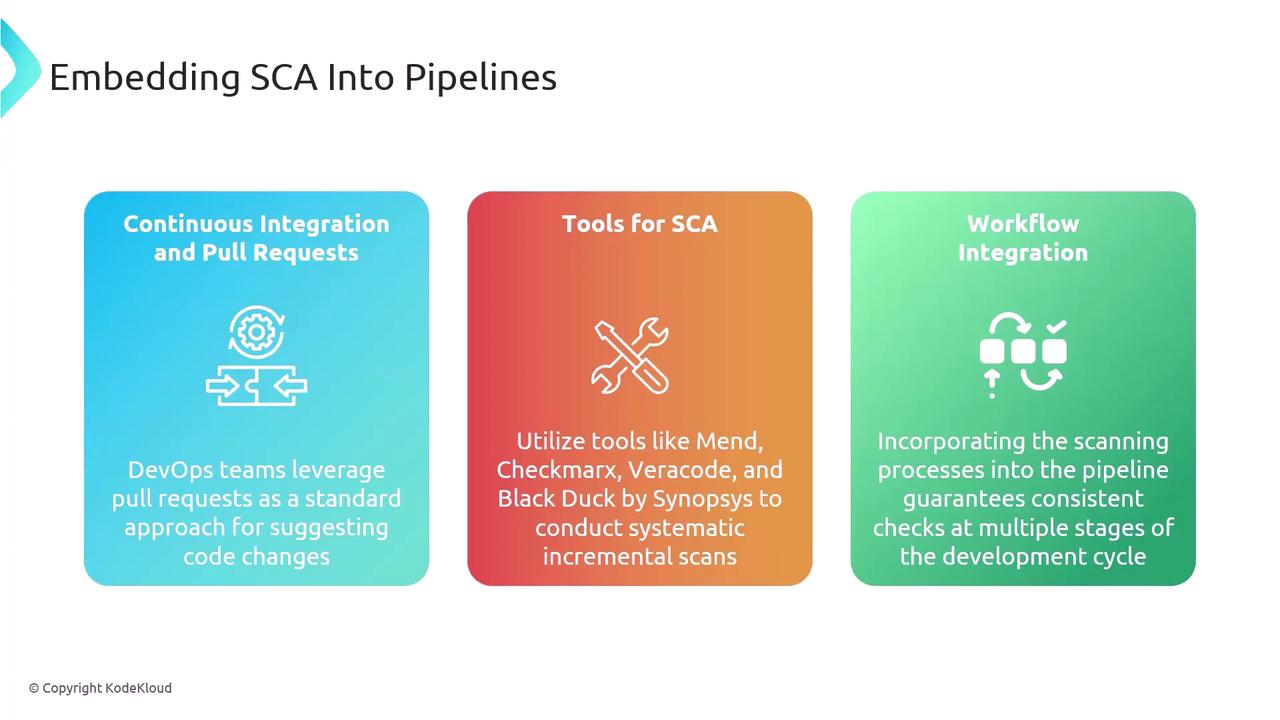AZ-400: Designing and Implementing Microsoft DevOps Solutions
Implement Security and Validate Code Bases for Compliance
Integrating SCA into pipelines
Embedding Software Composition Analysis (SCA) into your DevOps workflows empowers teams to automatically detect vulnerabilities and license risks in open-source components. This proactive approach not only enforces secure software delivery but also aligns with best practices for the AZ-400 exam.
Why Embed Software Composition Analysis?
Incorporating SCA early in your pipeline helps you:
- Catch security issues before they reach production
- Reduce the cost and effort of late-stage remediation
- Enforce uniform security policies across all pull requests
Note
Shifting security left with SCA accelerates feedback loops and safeguards your main branch from hidden vulnerabilities.
How SCA Fits into a DevSecOps Pipeline
When a developer opens a pull request:
- The CI system triggers an automated build based on established policies.
- An incremental SCA scan runs against new or modified code and dependencies.
- If vulnerabilities are found, the build fails and the PR cannot merge until fixes are applied.
This early-warning mechanism prevents insecure code from entering the main branch and becoming more expensive to correct.

1. Continuous Integration and Pull Requests
Pull requests serve as the perfect gate for security validation. Configure your CI platform—Azure Pipelines, GitHub Actions, Jenkins, or others—to initiate SCA scans on every PR. This ensures no code merges without passing vulnerability checks.
2. Tools for SCA
Compare popular SCA solutions that integrate seamlessly into your pipeline:
| Tool | Key Features | Integration Examples |
|---|---|---|
| Mend | Incremental scans, policy enforcement | Azure DevOps, GitHub |
| Checkmarx | Code and open-source analysis | Jenkins, GitLab CI |
| Veracode | Cloud-based scanning, detailed reporting | Azure Pipelines, Bitbucket |
| Black Duck | Dependency hygiene, license compliance | GitHub Actions, CircleCI |
3. Workflow Integration
Automate SCA at defined stages of your build or release pipeline:
- Pre-merge Checks: Block pull requests with critical findings.
- Nightly Scans: Perform full-codebase audits to catch drift.
- Release Gates: Ensure no high- or medium-risk issues remain before deployment.
By embedding these scans, you eliminate manual steps and guarantee consistent coverage across all development phases.
Next Steps & References
Implementing SCA in your pipelines ensures a secure, compliant, and efficient delivery process—core requirements for both production readiness and the AZ-400 certification.
Watch Video
Watch video content